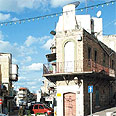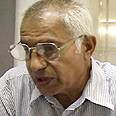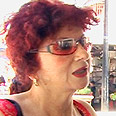


While some of the Arab residents seek to stress the cooperation and good relations between themselves and the Jews, the latter find it difficult to forgive what they view as almost a kind of treason – the support for Nasrallah during the war.
They find it difficult to understand why the Arabs have so far refused to criticize the Hizbullah leader and his organization, in spite of the rockets he launched at them. There is no doubt that Nasrallah has managed to create a rift in the neighborhood.
"Why can't you speak freely and condemn Nasrallah?" Marlene Sha'anan asks during an argument with Nadima Switi, a café owner at the local market.
"Luckily this time they didn’t go and dance on the rooftops, because Arabs were hurt," she adds cynically.
"They betrayed us," says Or Keidar, who works in Wadi Nisnas. "You don’t go to their places with the same feeling anymore, there is tension now."
Have you tried talking to them?
"I am afraid of them. That's why I don’t tell them anything about Nasrallah and Hizbullah."
Elias Saada, whose friend was killed after being hit by a rocket, is convinced that the relations between Arabs and Jews are good, and does not believe that he should condemn Nasrallah.
"I don’t hate him. Why should I hate him?" he asks.
"There is nothing left to say, they identify with Nasrallah and have manifested that during the war," says Ami Vaaknin, another resident. "Some give you the feeling that you are here temporarily."
"I have, for example, an Arab neighbor with whom I have a habit of arguing. He showed me on his cell phone shocking pictures, which he downloaded from the internet, of our tanks hit by anti-tank missiles. And they are passing it around among themselves," he adds.
'War at the service of the Americans'
During the war, the historical building of the communist newspaper al-Ittihad, located at the heart of the neighborhood, was directly hit by a rocket, and part of the archive was damaged. Two people were killed in a nearby building as a result of the hit.
The wreckage in the area was still noticeable this week. Only one worker was seen fixing a roof. The newspaper's offices are located nearby, and the entrance looks like it was taken from a different reality. Pictures of Marx and Engels decorate the walls, alongside photos of Palestinian casualties.
"Great writers such as Emil Habibi developed in our historical building, and we were definitely angry that our archive was hit," says the editor Ahmed Saad. "But my message is not to Nasrallah, but rather to the Israeli government, which brought this disaster upon us. It was a war at the service of the Americans."
Vaaknin's business is located two buildings away from there.
"It's really not a great loss," he says. "Nothing was burned in that archive, because everything there was lies."















